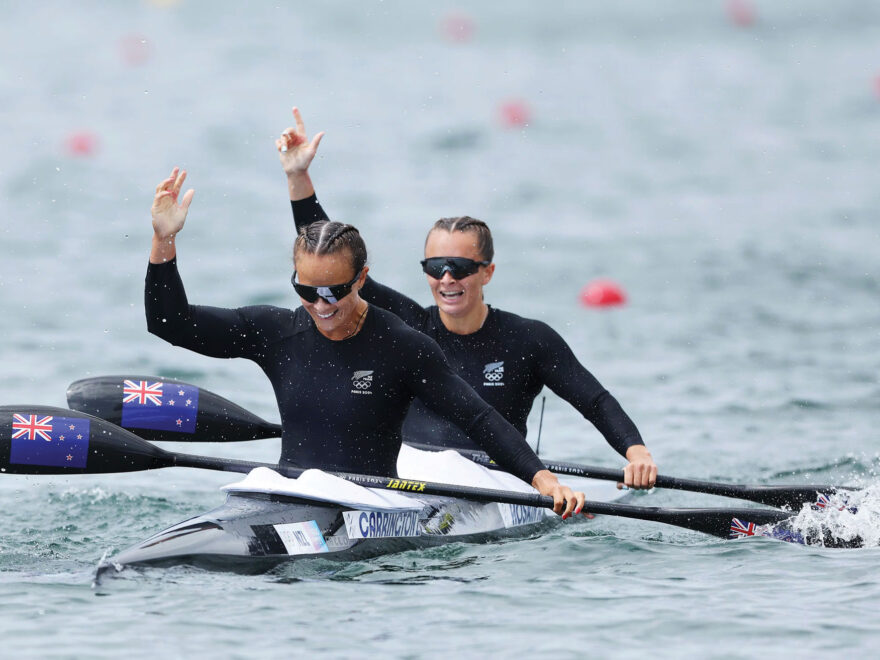Kayak queen Lisa Carrington capped a golden Paris Games by knocking an immortal off the perch as New Zealand’s greatest ever Olympian. MARC HINTON reports.
When Kiwi queen of the kayak Dame Lisa Carrington arrived back in New Zealand on a sunny late-winter’s morning in August, those three gold medals from the 2024 Olympics draped around her neck were not the only symbols of supremacy she returned with from a Games for the ages in the timeless city of Paris.
You could not see it, for it takes no earthly form, but the 35-year-old smiling superstar from the Bay of Plenty also assuredly brought back with her the mantle of New Zealand’s greatest ever Olympian, nudging the late, great Sir Peter Snell into the silver medal position among the pantheon of Kiwis who have performed special things on the greatest sporting stage of all.
It seems inconceivable that anyone could have knocked Snell off his lofty perch. The long-striding, barrel-chested Aucklander always seemed an untouchable, immortal figure as this country’s iconic, almost heroic, Olympian, winning three middle-distance gold medals – including the blue riband 1500 metres – at consecutive Olympic Games in the 1960s (Rome and Tokyo).
It wasn’t just that Snell became New Zealand’s first multiple gold medallist at a time when those precious medals were few and far between, but that he did it in the Games’ flagship sport (athletics), in its premium events, first as a massive underdog (winning the 800m gold in Rome in 1960) and then achieving the rare 800-1500 double in Tokyo four years later (one of only two males to have done it) as a known quantity at the peak of his powers. Then he retired, at the age of 27. Legend assured.
New Zealand has had some spectacular Olympic performers since – Sir Mark Todd, Ian Ferguson and Paul MacDonald, Dame Valerie Adams, Hamish Bond, the Evers-Swindell twins and Danyon Loader among those to have secured multiple golds – but none have surpassed the magnitude of Snell’s deeds.
Until now.
Carrington hasn’t just nudged past Snell’s standard, she’s left him in her shimmering wake, according to astute judges of New Zealand sporting history. And it’s hard to fault their logic, even if her sport lacks the global imprint of track and field.
The majestic paddler, at an age when many athletes are battling physical decline, was as impressive as ever – maybe even more so – at the Vaires-sur-Marne Nautical Stadium where she won triple gold in the K1, K2 and K4 500m to spearhead a groundbreaking haul for the Kiwi Olympic team. Their 10 golds were a Games record and 20 medals in total matched the previous best feat from Tokyo.
Carrington’s efforts matched her Tokyo feats three years earlier and took her tally from the Olympics to eight gold medals and a bronze. In fact, out of the 11 Olympic kayaking events she has contested since her 2012 debut, she has only finished outside the medals twice – 7th in the K2 500 in 2012 and fourth in the K4 500 in 2021. Remarkable.
We could go on. There was a majestic nature to her efforts in Paris. The K1 and K2 victories were dominant, and her leadership in pulling a youngish K4 crew through to the gold spoke volumes for her greatness. Throughout it all was a steely focus and incredible drive that has turned the greatest solo paddler her sport has seen into the finest all-round kayaker in history.
Two more factors worth considering on the Carrington resume. Since 2012 she has been involved in almost a third of the golds collected by New Zealand; and the longevity factor – Carrington was 23 at her first Olympics yet remains the benchmark 12 years later.
Now the question everyone wants answered is will she carry on through to the 2028 Games in Los Angeles? For now, the Halberg supreme award favourite is keeping her options open.
“After having such a successful Olympics and being at the level I am at, [LA 28] is obviously really enticing,” she told reporters in Paris. “But at the moment I think it’s just kind of put my feet up.”
Carrington also spoke about the “privilege” to compete at the level she did in Paris. “Wanting to perform to my best and strive for excellence has given me a lot of growth over the last 12 years,” she added. “You put goals out there to try to win … but it’s more than the medals for us. No matter the results… we, as a team, have grown and done amazing things together.
“It’s about meeting the moment. Sometimes the pressure of the Olympics gets to people. All you need to do is figure out how to just turn up and do what you do in training and be yourself. That’s the hardest part.”
Carrington spearheaded a magnificent effort from the Kiwi wahine in Paris, with women winning eight of the 10 golds. Cyclist Ellesse Andrews, with a notable track cycling double (keirin and sprint), as well as silver in the team sprint, and golfer Lydia Ko, whose memorable victory now gives her the full Olympic set, were the other notable performers.
The Black Ferns sevens and double-scullers Brooke Francis and Lucy Spoors joined the female gold rush, with whitewater paddler Finn Butcher and high jumper Hamish Kerr chiming in from the male side. They all bow before New Zealand’s kayak queen.

